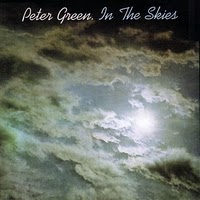 So, after eight years away from the music scene does Peter Green still have it? Of course he did! This album is almost, for me, a testament to the longevity of raw talent. Considering all that Peter Green had been through throughout the decade, it’s quite something that he could come up with something this good (as well as putting out a record better than 1079’s effort from his former bandmates). The only slight downer is the uncertainty over which songs Peter Green actually plays lead on due to his ill-health, but that doesn’t really detract from the quality of these songs. There’s a really laid back feel to the album, like mellow blues. “A Fool No More” was the only song I’d heard prior to purchasing the album and it’s probably this song that sounds most like Green’s Mac efforts (it was originally written for the first Fleetwood Mac album). The guitar playing and vocals are strong, as they are on the other vocal led tracks “In The Skies”, “Seven Stars” and “Just For You”. “In The Skies”, “Tribal Dance” and “Proud Pinto” have Santana-esque rhythm sections and drums, underpinning the laid back mood and displaying Peter Green’s musical influences. “Slabo Day” has a really nice riff and emotive leads (the sleeve notes state that Snowy White plays lead on this track), and “Apostle” is a beautiful closer to the album, displaying the feel and sensitivity of Green’s compositions. As the first of Peter Green’s many comebacks, “In The Skies” is a great effort and a worthy addition to the man’s catalogue. –Tom
So, after eight years away from the music scene does Peter Green still have it? Of course he did! This album is almost, for me, a testament to the longevity of raw talent. Considering all that Peter Green had been through throughout the decade, it’s quite something that he could come up with something this good (as well as putting out a record better than 1079’s effort from his former bandmates). The only slight downer is the uncertainty over which songs Peter Green actually plays lead on due to his ill-health, but that doesn’t really detract from the quality of these songs. There’s a really laid back feel to the album, like mellow blues. “A Fool No More” was the only song I’d heard prior to purchasing the album and it’s probably this song that sounds most like Green’s Mac efforts (it was originally written for the first Fleetwood Mac album). The guitar playing and vocals are strong, as they are on the other vocal led tracks “In The Skies”, “Seven Stars” and “Just For You”. “In The Skies”, “Tribal Dance” and “Proud Pinto” have Santana-esque rhythm sections and drums, underpinning the laid back mood and displaying Peter Green’s musical influences. “Slabo Day” has a really nice riff and emotive leads (the sleeve notes state that Snowy White plays lead on this track), and “Apostle” is a beautiful closer to the album, displaying the feel and sensitivity of Green’s compositions. As the first of Peter Green’s many comebacks, “In The Skies” is a great effort and a worthy addition to the man’s catalogue. –Tom
Rock
Harry Nilsson “Aerial Ballet” (1968)
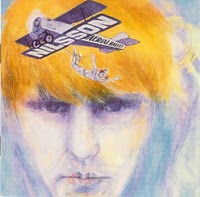 After the Beatles blew everything else off the charts, most artists tried too hard to be “difficult” while others were too stuck in the past, not even attempting to catch up. I think the reason Aerial Ballet impressed Lennon so much and remains classic to this day, is that Nilsson’s songs contained a sweet yearning for yesteryear paired with a (then) modern touch of artistic genius. “Together” is a wonderfully, breezy pop tune, “Everbody’s Talkin” is an incredible cover that got Harry up on the charts, and “One” of course is one of the greatest songs ever written (nothing beats the original, here). –Allistair
After the Beatles blew everything else off the charts, most artists tried too hard to be “difficult” while others were too stuck in the past, not even attempting to catch up. I think the reason Aerial Ballet impressed Lennon so much and remains classic to this day, is that Nilsson’s songs contained a sweet yearning for yesteryear paired with a (then) modern touch of artistic genius. “Together” is a wonderfully, breezy pop tune, “Everbody’s Talkin” is an incredible cover that got Harry up on the charts, and “One” of course is one of the greatest songs ever written (nothing beats the original, here). –Allistair
Talking Heads “Remain in Light” (1980)
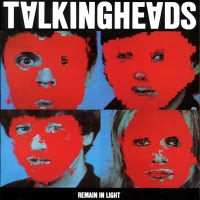 In the height of punk and the beginning of hip-hop, white and black music had never been more distant. David Bryne had his eye on fixing that. The funky rhythm section returns more complete then ever with Bryne being more characteristic then ever playing with words and sounds that is both unbelievably cool and bizarre. Brian Eno’s songwriting contribution and production just top it off, from the computer freak out in the opening track to the excellent “Once in a Lifetime”. Above all, it’s Byrne’s tackling questions about our identity in a booming society (“Seen and Not Seen”) and sympathizing with people that aren’t a part of it (“Listening Wind”), that makes it all the more poignant. It’s like those parties where everyone gets drunk and dances their asses off, and around 3am the guys with beards who like to talk about their emotions go on about the government and the super ego. –Allistair
In the height of punk and the beginning of hip-hop, white and black music had never been more distant. David Bryne had his eye on fixing that. The funky rhythm section returns more complete then ever with Bryne being more characteristic then ever playing with words and sounds that is both unbelievably cool and bizarre. Brian Eno’s songwriting contribution and production just top it off, from the computer freak out in the opening track to the excellent “Once in a Lifetime”. Above all, it’s Byrne’s tackling questions about our identity in a booming society (“Seen and Not Seen”) and sympathizing with people that aren’t a part of it (“Listening Wind”), that makes it all the more poignant. It’s like those parties where everyone gets drunk and dances their asses off, and around 3am the guys with beards who like to talk about their emotions go on about the government and the super ego. –Allistair
What a gathering of great musical minds. Adrian Belew, Brian Eno AND David Byrne!? What results is like the offspring of 80’s King Crimson and David Bowie’s Low on uppers. “House in Motion” is ridiculously fun to listen to. The Reggae rhythm mixed with East Indian themes, Adrian Belew doing his thing on guitar, the repeating electronic trumpet and that “mbarp” sound. What the heck is that sound? –Rob
Gentle Giant “Octopus” (1972)
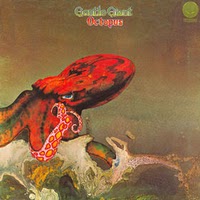 Octopus manages to be one of the most beautiful, creative and insane albums from the 70’s simultaneously. Gentle Giant’s strange progressive mix of classical music and hard rock, along with the medieval feeling vocals is very refreshing. Especially among other “prog” groups like Pink Floyd that grow stale. Octopus branches in as many directions as an octopus has legs. Very few other prog-rock groups have ever come close to equaling this level of achievement. –Rob
Octopus manages to be one of the most beautiful, creative and insane albums from the 70’s simultaneously. Gentle Giant’s strange progressive mix of classical music and hard rock, along with the medieval feeling vocals is very refreshing. Especially among other “prog” groups like Pink Floyd that grow stale. Octopus branches in as many directions as an octopus has legs. Very few other prog-rock groups have ever come close to equaling this level of achievement. –Rob
Chameleons “Strange Times” (1986)
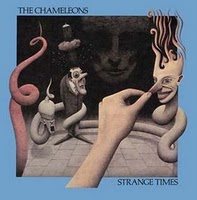 How can you not think The Chameleons are the most underrated band of all time, once you get this far into their catalogue? The guitars single handedly inspired U2 and Interpol, the lyrics were approaching topics unconventional and honest, and the albums were just so complete and original. From the sorrow of losing a close friend to the excitement/desperation of losing your virginity, Strange Times carried a weird variety of topics and themes that carried feelings of joy and sadness. With no mention in Rolling Stones top 500 albums list, no mention in Pitchfork’s 80s list, a recent reunion that went unnoticed, there is no second chance for the mainstream to get a glimpse into the genius of The Chameleons. It will forever be remained as that band with the awesome sleeves that your uncle has in his collection. Probably some derivative post-punk shit, nothing important. –Allistair
How can you not think The Chameleons are the most underrated band of all time, once you get this far into their catalogue? The guitars single handedly inspired U2 and Interpol, the lyrics were approaching topics unconventional and honest, and the albums were just so complete and original. From the sorrow of losing a close friend to the excitement/desperation of losing your virginity, Strange Times carried a weird variety of topics and themes that carried feelings of joy and sadness. With no mention in Rolling Stones top 500 albums list, no mention in Pitchfork’s 80s list, a recent reunion that went unnoticed, there is no second chance for the mainstream to get a glimpse into the genius of The Chameleons. It will forever be remained as that band with the awesome sleeves that your uncle has in his collection. Probably some derivative post-punk shit, nothing important. –Allistair
Jeff Beck Group “Truth” (1968)
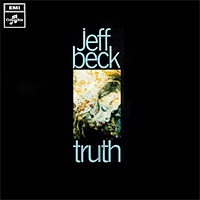 Blow by Blow is the only other Jeff Beck album I’ve heard and it’s completely different from this one. It’s groovy, instrumental fusion that matched the musical trends of the 1970s. Truth on the other hand is heavy Blues-Rock that a lot of people cite as the birth of Heavy Metal. Blues slide guitarists like Robert Nighthawk and Hound Dog Taylor that would crank their amps way the hell up and play with a mean streak deserve just as much credit though. You can’t pin the creation of any genre on a single person. In general the music has a vibe that really reminds me of The Who for some reason. The guitar playing of Jeff Beck is potent and the vocals are a surprise. Rod Stewart used to know how to rock? I wonder what happened to the guy. –Rob
Blow by Blow is the only other Jeff Beck album I’ve heard and it’s completely different from this one. It’s groovy, instrumental fusion that matched the musical trends of the 1970s. Truth on the other hand is heavy Blues-Rock that a lot of people cite as the birth of Heavy Metal. Blues slide guitarists like Robert Nighthawk and Hound Dog Taylor that would crank their amps way the hell up and play with a mean streak deserve just as much credit though. You can’t pin the creation of any genre on a single person. In general the music has a vibe that really reminds me of The Who for some reason. The guitar playing of Jeff Beck is potent and the vocals are a surprise. Rod Stewart used to know how to rock? I wonder what happened to the guy. –Rob
Jefferson Airplane “Crown of Creation” (1968)
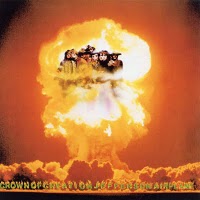 By the time “Crown of Creation” came out the Airplane were fully loaded with incredible musicians and an album’s worth of uniquely creative songs. Ranging from their exotic take on alternative lifestyles to the acid crazed end of the world. The instruments, voices and sound experiments expand in an effortless collage of psychedelic consciousness. A collision of modern art and contemporary music that helped to define the hypnotic sixties. –Scott
By the time “Crown of Creation” came out the Airplane were fully loaded with incredible musicians and an album’s worth of uniquely creative songs. Ranging from their exotic take on alternative lifestyles to the acid crazed end of the world. The instruments, voices and sound experiments expand in an effortless collage of psychedelic consciousness. A collision of modern art and contemporary music that helped to define the hypnotic sixties. –Scott
The Beach Boys “Wild Honey” (1967)
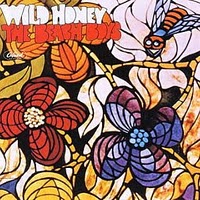 Short, sweet, and playful, this modest collection of effortless pop might not deliver on the promise of Pet Sounds or “Good Vibrations,” but its take on white soul has a sunny, domestic charm to it that’s irresistible, and the unadorned production—sketchy underproduction, in fact—is a great antidote to hermetic studio indulgence and the psychedelic trappings of the day, which makes this, in its own way, a rather bold release for its time. I’m in agreement with the reviewers who put this in the upper ranks of the group’s albums; there are days when I prefer this to Pet Sounds. –Will
Short, sweet, and playful, this modest collection of effortless pop might not deliver on the promise of Pet Sounds or “Good Vibrations,” but its take on white soul has a sunny, domestic charm to it that’s irresistible, and the unadorned production—sketchy underproduction, in fact—is a great antidote to hermetic studio indulgence and the psychedelic trappings of the day, which makes this, in its own way, a rather bold release for its time. I’m in agreement with the reviewers who put this in the upper ranks of the group’s albums; there are days when I prefer this to Pet Sounds. –Will
13th Floor Elevators “Easter Everywhere” (1967)
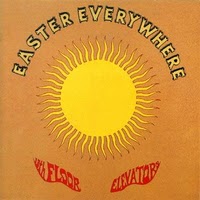 If all psychedelic records where this good I’d listen to nothing else. As we all know there not. Side one is flawless with even the Dylan cover (“Baby Blue”) being mind expandingly good. Side two’s almost as good and that alone is an incredible feat. One of my favorite 60’s albums of all time and my favorite psych album period. –Brian
If all psychedelic records where this good I’d listen to nothing else. As we all know there not. Side one is flawless with even the Dylan cover (“Baby Blue”) being mind expandingly good. Side two’s almost as good and that alone is an incredible feat. One of my favorite 60’s albums of all time and my favorite psych album period. –Brian
Alice Cooper “Love It to Death” (1971)
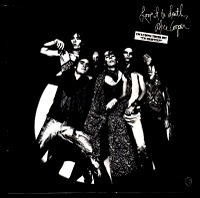 Love it to Death is the perfect brew of the Alice Cooper band’s mixture of hard rock, juvenile delinquency and shock rock theatrics. A lot of its strength relies in its diversity and the band always manages to sound convincing and original. Just look at the final three songs: the dark “Second Coming” plays out with a grand, stirring piano section into the unnerving lunacy of “The Ballad of Dwight Fry” before ending with the folky sing-a-long “Sun Arise”. “Caught in a Dream” and “Long Way To Go” are effective, short garage rockers that contrast with the extended, intense psychedelic trip of “Black Juju”. “I’m Eighteen” has simple lyrics that perfectly capture the confusion and disarray of adolescence and “Is It My Body” is a short, lusty rocker with a great guitar tone. “Hallowed be thy Name” is the weaker of the bunch, but it doesn’t really detract from the album as a whole and “Love it to Death” is a first rate seventies hard rock album. –Ben
Love it to Death is the perfect brew of the Alice Cooper band’s mixture of hard rock, juvenile delinquency and shock rock theatrics. A lot of its strength relies in its diversity and the band always manages to sound convincing and original. Just look at the final three songs: the dark “Second Coming” plays out with a grand, stirring piano section into the unnerving lunacy of “The Ballad of Dwight Fry” before ending with the folky sing-a-long “Sun Arise”. “Caught in a Dream” and “Long Way To Go” are effective, short garage rockers that contrast with the extended, intense psychedelic trip of “Black Juju”. “I’m Eighteen” has simple lyrics that perfectly capture the confusion and disarray of adolescence and “Is It My Body” is a short, lusty rocker with a great guitar tone. “Hallowed be thy Name” is the weaker of the bunch, but it doesn’t really detract from the album as a whole and “Love it to Death” is a first rate seventies hard rock album. –Ben
Maxophone “Maxophone” (1975)
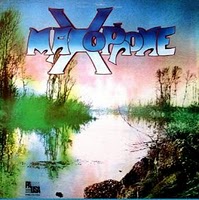 The lone album from Maxophone is another piece of archaeological evidence pointing towards the inevitable conclusion that the Italians took progressive rock to heights only hinted at by their UK contemporaries. While richly melodic, Maxophone nevertheless are as go-for-broke with their ornamented arrangements as any other Italian prog act, regularly spouting riffs offering more twists than a bowl of fusilli, bursting into flowery orchestral beauty, or detouring down a jazzy sax-mad side road at the drop of a hat. The layered vocals are delivered with the inspired passion that hallmarks the genre, also managing to hit some angelic falsettos along the way. –Ben
The lone album from Maxophone is another piece of archaeological evidence pointing towards the inevitable conclusion that the Italians took progressive rock to heights only hinted at by their UK contemporaries. While richly melodic, Maxophone nevertheless are as go-for-broke with their ornamented arrangements as any other Italian prog act, regularly spouting riffs offering more twists than a bowl of fusilli, bursting into flowery orchestral beauty, or detouring down a jazzy sax-mad side road at the drop of a hat. The layered vocals are delivered with the inspired passion that hallmarks the genre, also managing to hit some angelic falsettos along the way. –Ben
Fleetwood Mac “Then Play On” (1969)
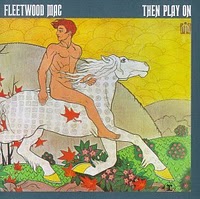 If I was forced to name a favorite album, then I think I might go for “Then Play On”. I can’t really think of another album I consistently enjoy as much. With Danny Kirwan on board the expectation no longer falls squarely on Peter Green’s shoulders and Kirwan’s arrival had already bore fruit with the preceeding “Albatross” and “Man of the World” singles. There’s a much broader feel on here than the previous Fleetwood Mac albums and “Then Play On” includes everything you could want on an album: soul-searching ballads (“Closing My Eyes”, “Before the Beginning”), raucous rock ‘n’ roll (“Coming Your Way”, “Rattlesnake Shake”, “Oh Well (Part One)”), McCartney-esque pop ditties (“Although the Sun is Shining”, “When You Say”), serene instrumentals (“My Dream”, “Underway”, “Oh Well (Part Two)”) and breathtaking jams (“Looking for Madge”, “Fighting for Madge”). Listening to “Then Play On” is particularly interesting when you consider how troubled the chief song writers would become in the ensuing months, years and decades. You can almost sense something ominous on Peter Green’s horizon when listening to “Closing My Eyes”, “Show-Biz Blues” (which includes the line “and you’re sitting there so green, believe me man I’m just the same as you), the acoustic section of “Oh Well” or “Before the Beginning”. There’s something incredibly sad about Peter Green’s contributions here although he still gets down and dirty for “Rattlesnake Shake”, an ode to masterbation. Danny Kirwan proves himself to be a phenomenal song writer with his delicate, beautiful ballads and his album opener “Coming your Way” has an epic guitar outro. There isn’t one dud to be found here and “Then Play On” is never anything less than an engrossing, moving, imaginative, flawless, impressive album from a band who may not have even hit there peak yet. –Tom
If I was forced to name a favorite album, then I think I might go for “Then Play On”. I can’t really think of another album I consistently enjoy as much. With Danny Kirwan on board the expectation no longer falls squarely on Peter Green’s shoulders and Kirwan’s arrival had already bore fruit with the preceeding “Albatross” and “Man of the World” singles. There’s a much broader feel on here than the previous Fleetwood Mac albums and “Then Play On” includes everything you could want on an album: soul-searching ballads (“Closing My Eyes”, “Before the Beginning”), raucous rock ‘n’ roll (“Coming Your Way”, “Rattlesnake Shake”, “Oh Well (Part One)”), McCartney-esque pop ditties (“Although the Sun is Shining”, “When You Say”), serene instrumentals (“My Dream”, “Underway”, “Oh Well (Part Two)”) and breathtaking jams (“Looking for Madge”, “Fighting for Madge”). Listening to “Then Play On” is particularly interesting when you consider how troubled the chief song writers would become in the ensuing months, years and decades. You can almost sense something ominous on Peter Green’s horizon when listening to “Closing My Eyes”, “Show-Biz Blues” (which includes the line “and you’re sitting there so green, believe me man I’m just the same as you), the acoustic section of “Oh Well” or “Before the Beginning”. There’s something incredibly sad about Peter Green’s contributions here although he still gets down and dirty for “Rattlesnake Shake”, an ode to masterbation. Danny Kirwan proves himself to be a phenomenal song writer with his delicate, beautiful ballads and his album opener “Coming your Way” has an epic guitar outro. There isn’t one dud to be found here and “Then Play On” is never anything less than an engrossing, moving, imaginative, flawless, impressive album from a band who may not have even hit there peak yet. –Tom


